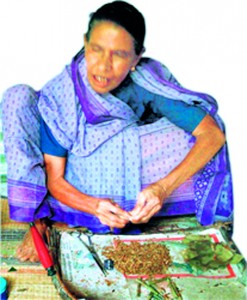Beedi, cheaper alternative for the ‘poor man’
Customs statistics indicate that beedi volumes have risen from 1.1.billion sticks in 2007 to 3.2 billion sticks in 2013, a growth of almost 200 per cent over the past six years. Interestingly the data also depicts a 13 per cent decline in the cigarette volumes during the same period of time – 4.6 billion sticks in 2007 to 4.0 billion in 2013.
Furthermore, according to a recent study done by the global research agency Nielsen, approximately 42 per cent of the estimated 7.2 billion Sri Lankan tobacco market is now controlled by beedi, making it an unseen threat.
This growing preference for Beedi can be accounted for the high prices of legal cigarettes while Beedi has remained a low price alternative. This is supported by the fact that while the price of a regulated stick of cigarette has increased 100 per cent from 2007 to 2014 (from Rs. 14 to Rs. 28), the price of a stick of Beedi during the same time period has increased only by a mere 50 cents, leaving it affordably priced at around Rs. 2. Currently available in over 140 brand names in the market, Beedi by escaping the tax net is able to keep prices low, and in doing so deprive the government of much- needed revenue.
It is also reported that the growing Beedi sales in Sri Lanka have yielded insignificant levels of revenue to the government and continue to flourish unchecked. The absence of a legal framework for its operators also means that the attractive packaging in which Beedi is freely available is not legally required to carry any form of health warning labels which cigarette packs must carry.
As a result Beedi has grown in popularity amongst the lower income earning rural populations. A consumer can purchase up to 5 Beedi sticks as opposed to one stick of the cheapest legal cigarette available in Sri Lanka making it an inexpensive form of intoxication for the poor man. Since Beedi is mostly consumed by the daily wage labour who is unaware of its health effects, perhaps a health warning is more suitable in this case. As a result of the lack of information on Beedi, public health campaigns are yet to gain traction of this growing threat.
Beedi is said to be labour intensive and largely home based industries in Sri Lanka, generating employment opportunities to many villagers. However, Beedi is produced out of low-quality tobacco with minimum attention to quality standards posing significant health risks to consumers.
Sarath Dambawinna
Former Provincial Council Member


